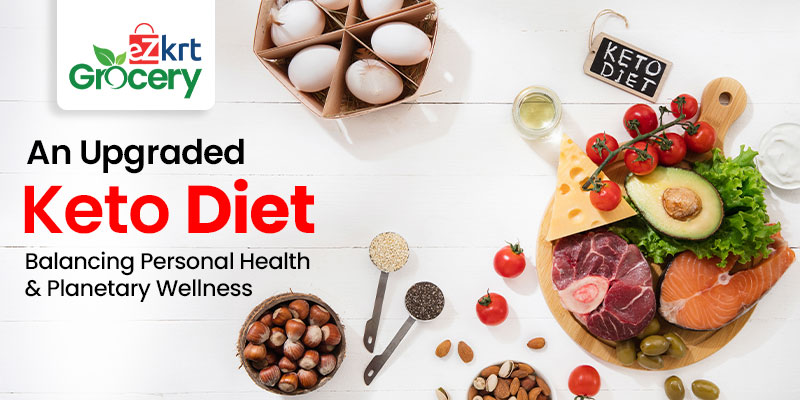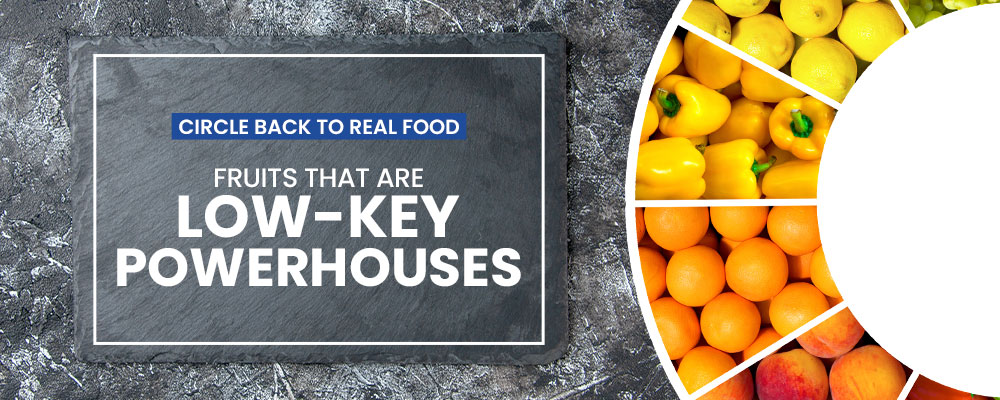An Upgraded Keto Diet: Balancing Personal Health and Planetary Wellness.

The ketogenic diet has gained widespread recognition for its potential to enhance health, particularly by supporting weight management and sustained energy levels. A traditional keto diet, heavily reliant on animal-based products, has a significant carbon footprint. For example, beef production generates approximately 16 kg of CO²e per kilogram, lamb about 17 kg CO²e, and butter nearly 17.6 kg CO²e. In comparison, plant-based alternatives such as lentils or tofu are far less taxing on the planet, with emissions ranging from 0.9 to 2 kg CO²e/kg.But can a keto diet be optimized to align with both personal health and sustainability? Read on to get a guiding light on keto for busy professionals while still balancing personal and planetary wellness.
1. Understanding Keto: The Science Behind the Diet.
The ketogenic diet focuses on drastically reducing carbohydrate intake and increasing fat consumption to shift the body into a state called ketosis. In ketosis, the body burns fat for energy instead of glucose, offering benefits like weight loss, improved mental clarity, and stable energy levels.
At its core, keto is about metabolic efficiency. Fat provides 9 calories per gram, compared to 4 calories per gram from carbohydrates or protein. This higher energy density allows for smaller portions while maintaining satiety, making it a practical choice for those looking to manage weight or optimize energy use.
2. Keto for Busy Professionals: Easing into the Diet.
For working professionals, adopting a ketogenic lifestyle can feel daunting amidst hectic schedules. Here are strategies to make the transition manageable:
- Meal Prepping: Plan and prepare meals ahead of time to avoid relying on high-carb convenience foods.
- Simple Breakfasts: Replace traditional carb-heavy breakfasts with easy, keto-friendly options like boiled eggs, avocado, or Greek yogurt.
- Portable Snacks: Stock up on portable snacks like nuts, seeds, or cheese sticks to maintain energy levels during busy days.
- Gradual Adjustments: Transition into keto by slowly reducing carb intake over a week or two to avoid the "keto flu."
For those balancing meetings, deadlines, and personal commitments, these small steps can make keto feel less overwhelming and more sustainable.
3. Sustainability in Keto: Exploring Types of Keto Diets
Adapting keto to fit individual preferences and goals is crucial for long-term success. Common types of keto diets include:
- Standard Keto: A classic approach with 70-75% fat, 20-25% protein, and 5-10% carbs.
- High-Protein Keto: Slightly more protein (around 35%) for those who are more active or focused on muscle retention.
- Cyclical Keto: Alternates between high-carb and keto days, suitable for athletes or those who need periodic carb boosts.
- Vegan Keto: Focuses on plant-based fats like coconut oil, avocado, and nuts while eliminating animal products.
Choosing the right type ensures the diet aligns with lifestyle, activity levels, and ethical considerations.
4. Vegan vs. Non-Vegan Keto: Environmental and Health Perspectives.
A significant consideration for keto enthusiasts is the environmental impact of their food choices. Animal products like beef, lamb, and butter are known for their high carbon footprints (16–17.6 kg CO²e/kg), while plant-based alternatives like lentils and tofu have significantly lower emissions (0.9–2 kg CO²e/kg).
- Vegan Keto: Relies on plant-based proteins such as tofu, tempeh, and seitan, combined with fats from avocado, nuts, and seeds. This version is more eco-friendly but requires careful planning to meet nutrient needs, particularly for vitamin B12 and iron.
- Non-Vegan Keto: Incorporates animal-based proteins like chicken, eggs, and fish. While these options have higher emissions than plant-based foods, substituting beef or lamb with chicken (6 kg CO²e/kg) or eggs (4.8 kg CO²e/kg) can significantly lower the diet’s carbon footprint.
By mixing plant-based fats and proteins with selective animal products, it is possible to create a hybrid approach that balances sustainability with nutritional adequacy.
5. Supporting the Planet with Keto-Friendly Choices.
Keto doesn’t have to be a high-impact diet. By focusing on seasonal, local, and organic produce, individuals can reduce the environmental toll of their food choices. Sustainable practices to consider include:
- Prioritizing Local Sources: Support farmers' markets and local food producers to minimize transportation emissions.
- Reducing Processed Foods: Opt for whole, unprocessed foods to avoid the energy-intensive processes involved in manufacturing and packaging.
- Ethical Sourcing: Choose free-range eggs, pasture-raised meats, and organic dairy to support environmentally responsible farming practices.
This mindful approach aligns with movements like slow food and organic farming, offering benefits for both health and the planet.
Keto with a Conscience.
A ketogenic diet can be tailored to prioritize both personal health and environmental well-being. Whether through adopting vegan keto, reducing reliance on high-emission proteins, or emphasizing local and seasonal produce, individuals can make choices that support their goals without compromising the planet’s future.
By balancing these considerations, the ketogenic lifestyle evolves into more than a diet—it becomes a sustainable, ethical, and health-promoting way of life.
If you’re in the UAE and looking to meet your nutritional needs, ezkrtgrocery.com is here to help. With our commitment to providing natural and organically sourced fruits, vegetables, and all things grocery from partner brands, you can shop and enjoy doorstep delivery. We emphasize affordability while maintaining high quality across the UAE. Our deals and discounts, along with quick delivery options, make it easier to stick to your diet plans without the hassle of traditional grocery shopping.





